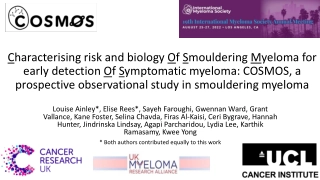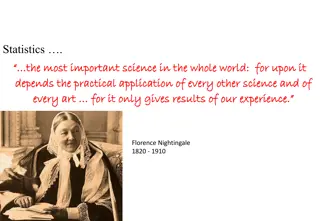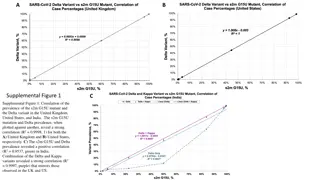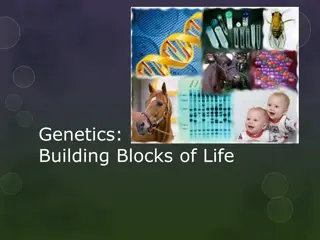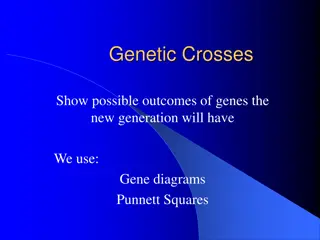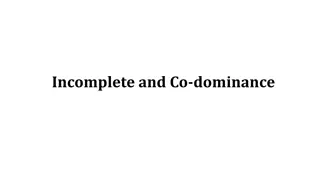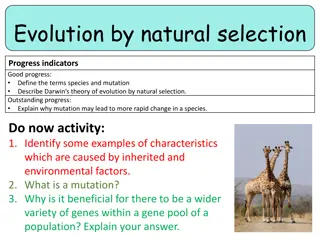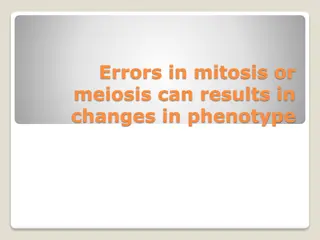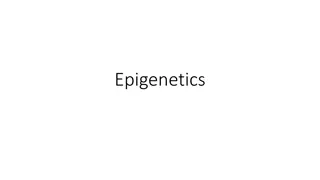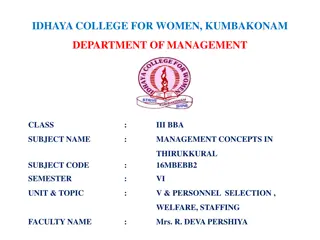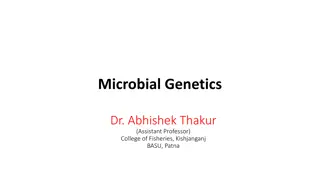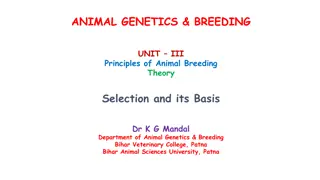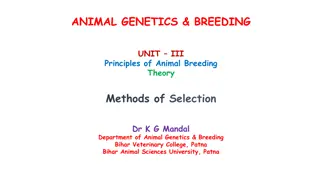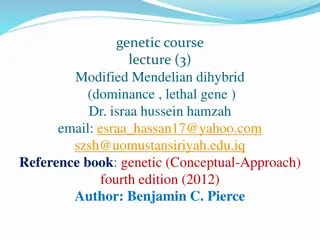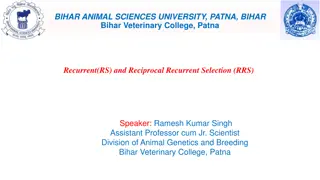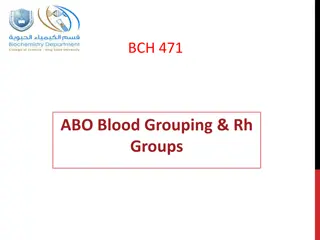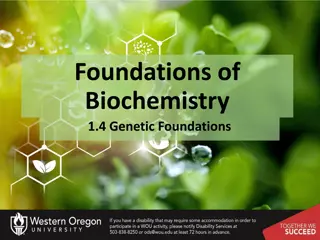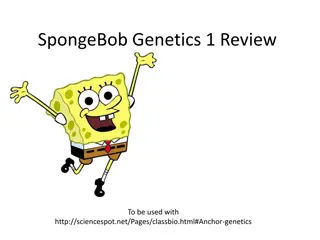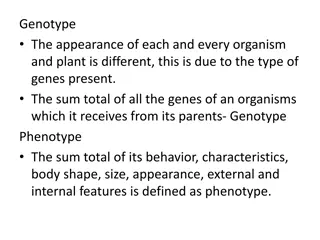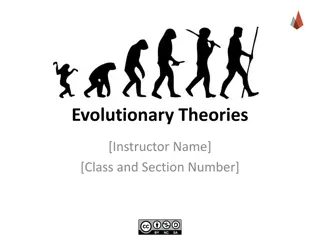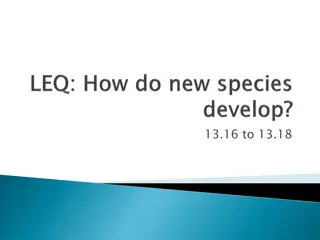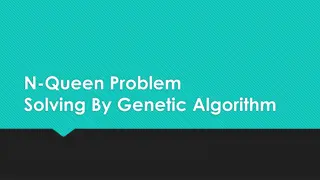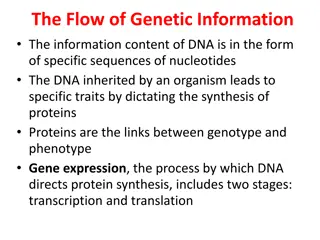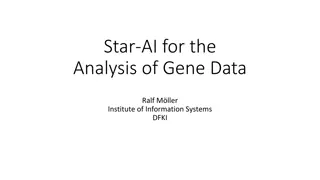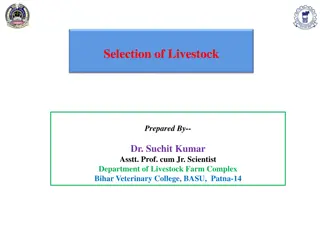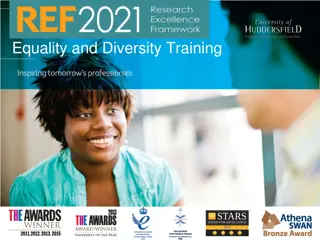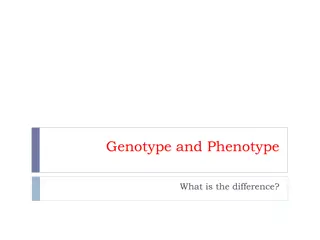Characterising Risk and Biology of Smouldering Myeloma for Early Detection of Symptomatic Myeloma
Understand the risk and biology of smouldering myeloma (SMM) for early detection of symptomatic myeloma. The study will investigate genomic and immune correlates of progression, clonal heterogeneity, and biomarkers using liquid biopsies and T cell phenotype and functionality in SMM.
4 views • 15 slides
INDIAN ARMY AGNIVEER SELECTION PROCESS 2024
https:\/\/youtube.com\/shorts\/3Errhs-10LM?si=gWwlhucXivM1v02s\n\n\n\nIndian Army Agniveer Selection Process 2024\nManasa Defence Academy is proud to offer the best Army training programs, including the NDA Crash Course (6 Months) and NDA Advance Course (1 Year). In this blog post, we will explore t
3 views • 1 slides
Understanding Logistic Regression Model Selection in Statistics
Statistics, as Florence Nightingale famously said, is the most important science in the world. In this chapter on logistic regression, we delve into model selection, interpretation of parameters, and methods such as forward selection, backward elimination, and stepwise selection. Guidelines for sele
4 views • 33 slides
Correlation of s2m G15U Mutant and Delta Variant Prevalence
The correlation between the prevalence of the s2m G15U mutant and the Delta variant in the UK, US, and India was analyzed, showing strong correlations in the UK and US, and a positive correlation in India. Analysis of the s2m phenotype in the Alpha, Delta, and Kappa variants was also conducted. Addi
3 views • 4 slides
Genetics: The Blueprint of Life
Genetics is the study of heredity and how traits are passed from parents to offspring. It involves understanding genetic makeup (genotype) and physical attributes (phenotype) determined by genes. Mendel's laws of segregation and independent assortment explain how alleles and traits are inherited. Nu
0 views • 34 slides
Understanding Genetic Crosses and Inheritance Patterns
Discover the world of genetic crosses through gene diagrams and Punnett squares. Explore the terminology, genotype, phenotype, and the concepts of dominance and recessiveness. Learn how genes control characteristics like eye color, delve into allele combinations for flower color, and see possible ou
0 views • 15 slides
Understanding Incomplete and Co-dominance in Genetics
Phenotypes and genotypes play crucial roles in understanding incomplete dominance and co-dominance. In incomplete dominance, alleles blend to produce a new phenotype, while in co-dominance, both alleles are expressed equally. Examples and problems illustrate these concepts further, aiding in genetic
0 views • 12 slides
Understanding Evolution by Natural Selection
Explore the concepts of species, mutation, Darwin's theory of evolution, and the role of genetic variation through mutations. Learn how mutations can lead to rapid changes in species and why a wider variety of genes in a gene pool benefits a population. Delve into the effects of mutations on individ
0 views • 15 slides
Chromosomal Alterations and Their Impact on Phenotype
Errors in mitosis or meiosis can result in changes in phenotype, often due to alterations in chromosome structure such as deletion, duplication, inversion, and translocation. Nondisjunction can lead to abnormal chromosome number, resulting in disorders like aneuploidy. Polyploidy, with extra complet
0 views • 9 slides
Understanding Epigenetics: DNA Methylation and Histone Modification
Epigenetics involves modifications that impact gene expression without altering DNA sequences, playing a crucial role in the transition from genotype to phenotype. This includes DNA methylation, histone modification, and microRNAs. DNA methylation, controlled by DNMT enzymes, can lead to either gene
5 views • 12 slides
Management Concepts in Personnel Selection and Welfare at Idhaya College for Women, Kumbakonam
The Department of Management at Idhaya College for Women in Kumbakonam offers insights into the importance of personnel selection in organizations. The process of personnel selection involves hiring individuals with the required qualifications to fill vacant positions. Proper selection and placement
0 views • 20 slides
Understanding Microbial Genetics and Mutations in Organisms
Explore the world of microbial genetics with Dr. Abhishek Thakur, an Assistant Professor specializing in Microbial Genetics at the College of Fisheries, Kishjanganj, BASU, Patna. Learn about important concepts such as strains, clones, genome, phenotype, genotype, genes, genetic recombination, and mu
0 views • 19 slides
Principles of Animal Breeding: Selection and its Basis
Selection in animal breeding involves choosing the best individuals to improve specific traits. Criteria for selection include individual merit, competitive exams, and interviews. Selection of farm animals focuses on non-random reproduction of genotypes. Types of selection include natural and artifi
1 views • 40 slides
Principles of Animal Breeding Theory and Methods of Selection
Animal breeding involves selecting for desirable traits to improve the overall merit of animals. Methods such as tandem selection and multi-trait selection are used to enhance genetic progress. Economic value, genetic significance, and selection criteria play important roles in the breeding process.
1 views • 16 slides
Recruitment and Selection Process in Human Resource Management
Recruitment and selection are vital processes in human resource management. Recruitment involves attracting candidates for job positions within an organization through various sources, both internal and external. The steps in recruitment include planning, strategy development, searching, screening,
0 views • 6 slides
Understanding Dominance in Genetics: The Role of Alleles and Phenotypes
Dominance in genetics refers to the interaction of alleles at the same gene locus. Complete dominance occurs when one allele masks the effect of another in a heterozygous genotype, leading to a phenotype indistinguishable from the dominant homozygote. This concept is crucial for predicting genetic o
1 views • 18 slides
Understanding Selection Strategies in Animal Genetics and Breeding
Genes influence traits through Additive Gene Action (AGA) and Non-Additive Gene Action (NAGA) in animal breeding. Recurrent Selection (RS) and Reciprocal Recurrent Selection (RRS) play crucial roles in improving animals. Selection for General Combining Ability (GCA) and Specific Combining Ability (S
0 views • 16 slides
Understanding ABO Blood Grouping and Rh Groups
ABO blood grouping and Rh factor testing are crucial for blood transfusions and forensic medicine. The presence or absence of specific antigens and antibodies in human blood determines blood type. Genetic inheritance from parents establishes blood type, with codominance influencing offspring phenoty
0 views • 13 slides
Selection Board Training and Human Resources Responsibilities in Hawaii National Guard
This document outlines the agenda for the Selection Board Training conducted by the Hawaii National Guard Human Resources Office. It covers recruitment, selection processes, decision-making, and job offer responsibilities. References to relevant U.S. Codes and Acts are provided. The structure of the
0 views • 48 slides
HelmholtzCloud Service Selection Process Overview
The Helmholtz Cloud Service Selection Process is detailed through service surveys, iterations, criteria types, and exclusion processes. Service providers deliver data, weighting and selection criteria are applied, and candidate services are listed based on surveys and integrations. Criteria categori
0 views • 41 slides
Understanding Punnett Squares and Genetic Crosses
Explore the world of genetics through Punnett squares and genetic crosses, where traits like eye color are predicted using Mendel's principles. Discover the laws of dominance, segregation, and how to determine genotype and phenotype ratios in offspring.
0 views • 23 slides
Understanding the Importance of Heredity and Genetics
Exploring the essential concepts of heredity and genetics, this content delves into the interplay between nature and nurture, the role of genetic code and DNA, and the mechanisms of inheritance. It highlights how genes influence behavior and the distinction between genotype and phenotype. Through vi
0 views • 21 slides
Enhancing Internet Telephony Quality Through Predictive Relay Selection
Examining the quality of Internet telephony in relation to network performance, this research explores the use of Managed Overlay to improve call quality for services like Skype. Analysis of 430 million Skype calls reveals that a significant portion experience poor network performance, emphasizing t
1 views • 26 slides
Understanding Genotype and Phenotype in Hereditary Traits
Exploring simple heredity through predicting and modeling phenotypes of Crazy Creatures, students are tasked with contrasting genotype and phenotype. The Crazy Traits lab data table is essential for recording alleles and genotypes, aiding in determining phenotypes for 14 different traits. By complet
0 views • 4 slides
Understanding Genetic Foundations and Protein Production in Biochemistry
Exploring the genetic foundations of biochemistry reveals how organisms evolve through natural selection and how phenotype and genotype are interconnected. The process of gene expression plays a crucial role in determining an organism's phenotype. Additionally, protein production through translation
0 views • 17 slides
SpongeBob Genetics Review Questions & Phenotype Determination
Explore genetics concepts using SpongeBob-themed questions to differentiate between heterozygous and homozygous genotypes, identify purebred and hybrid genotypes, and determine phenotypes based on dominant and recessive traits like body color and shape.
0 views • 17 slides
Understanding Transcription and Gene Expression in Biology
Explore the intricate process of transcription in biology, where mRNA is synthesized from DNA to carry the genetic code for protein production. Learn about the connection between genotype and phenotype, the role of genes in protein synthesis, and the significance of terms such as RNA Polymerase, int
0 views • 16 slides
Understanding Genotype and Phenotype: The Genetic Basis of Organism Variation
Genotype determines the genetic makeup of an organism, while phenotype encompasses its observable traits. Johannsen's theory states that phenotype is a result of genotype, which remains constant throughout life. The concept of phenocopy refers to mimicking another phenotype without altering the geno
0 views • 15 slides
Understanding Evolutionary Theories and Strategies
Exploring evolutionary theories such as Sexual Selection Theory and Gene Selection Theory sheds light on how characteristics evolve for mating advantage. Insights into intersexual and intrasexual competition offer a deeper understanding of mate selection preferences. Gene selection mechanisms influe
0 views • 20 slides
Understanding Natural Selection and Its Mechanisms
Explore the concepts of natural selection, survival of the fittest, and various types of selection processes in evolutionary biology. From the struggle for existence to sexual selection, learn how organisms adapt to their environment through genetic contributions and mating strategies. Discover exam
0 views • 8 slides
Solving N-Queen Problem Using Genetic Algorithm
Solving the N-Queen problem involves placing queens on a chessboard in such a way that they cannot check each other. The genetic algorithm approach addresses this problem through representations like phenotype and genotype, fitness evaluation based on queen penalties, mutations involving permutation
0 views • 8 slides
Maternal Effect on Shell Coiling in Snails
Maternal effects play a crucial role in determining the coiling direction of snail shells. The maternal inheritance of organelle genes controls certain traits in offspring, with the direction of shell coiling being a classic phenotype exhibiting maternal effects. The genotype of the female parent de
0 views • 7 slides
Student of the Year Guidelines and Selection Process Overview
Explore the revised 2020 Student of the Year guidelines, understand the selection process for Grades 5, 8, and 12, learn about scoring form revisions, LEA roles, components, paperwork submission, and more. Get insights on starting the selection process and completing necessary forms. Discover how in
0 views • 23 slides
Understanding the Flow of Genetic Information
The flow of genetic information involves the transmission of DNA content into specific protein synthesis through the processes of transcription and translation. Genes dictate the traits of an organism by directing the production of proteins, which serve as the connection between genotype and phenoty
0 views • 15 slides
Star-AI for Genetic Data Analysis: Incorporating Knowledge in Statistical Modeling
Knowledge-based approaches are crucial in genetic data analysis to enhance the accuracy and scope of genome-wide association studies (GWAS). Stochastic Relational AI (Star-AI) offers a solution by leveraging probability theory and First Order Logic to capture complex genetic interactions. By integra
0 views • 10 slides
Brigade Commander and Staff Selection Process Decision Briefing
In the decision briefing for the selection process of APS JROTC Brigade Commander and Staff, the purpose is to determine the best process that meets the needs, constraints, and preferences. The plan is to implement a standardized nomination and evaluation process in the selection of Brigade Commande
0 views • 18 slides
Understanding Selection Methods in Livestock Breeding
Livestock breeding involves various methods of selection such as individual selection, pedigree selection, progeny selection, and more. These methods aim to improve desirable traits in animals through controlled breeding programs. Selection criteria include performance, genetic lineage, and specific
0 views • 27 slides
Vigil Nomination and Selection Process Overview
The Vigil Nomination and Selection Process involves processes at both the chapter and lodge levels, including the appointment of chairman and adviser, duties of the nominating committee, eligibility criteria, survey letters, nominee selection, completing nomination forms, and deadlines for submissio
0 views • 30 slides
Challenges in Staff Selection for Equality and Diversity in Academic Institutions
Despite some progress, challenges persist in the selection of staff in academic institutions, particularly concerning under-selection of minority ethnic staff and those with disabilities. The report highlights disparities in selection rates based on gender, age, nationality, and ethnicity. Addressin
0 views • 27 slides
Understanding Genotype and Phenotype in Genetics
Genotype refers to the genetic code responsible for specific traits, while phenotype is the outward appearance and characteristics of an organism. Traits can be dominant or recessive, with alleles representing the possible choices for a characteristic. Genotypes consist of two letters, one from each
0 views • 7 slides
